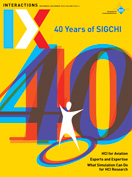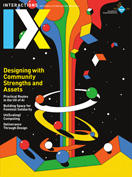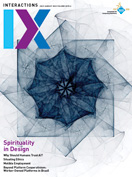Authors: Juan Hourcade
Posted: Tue, March 05, 2013 - 10:26:08
We are designing the cognitive future and most of the time we don’t even realize it. We are changing the way cognitive processes work in people who use the technologies we design, from perception to memory, attention, learning, communication, and social cognition. In fact, we may be seeing the beginnings of one of the largest shifts in cognition brought about by technology, perhaps even bigger than the changes brought by handwriting and mathematical notation.
The problem is that we have largely been reactive. For the most part, we design the next novel technology that the research market calls for without a holistic view of how all these technologies will affect how we think and how we interact with each other.
The good news is that we have choices. And we can have visions. What do we want the cognitive future to be like? If we can give people cognitive superpowers through technology, what should those be?
To get things started, let’s think about perception. We are already starting to see a bit of a revolution with a variety of technologies (e.g., Google Glass) that can greatly augment the amount of information we can access. Experiments conducted with mice and rats go further in pointing the way to what may be possible in the future. Using brain implants, it’s been possible to allow these mammals to perceive beyond their normal ability, for example, infrared perception, but generally it’s possible for them to perceive anything that a chip can detect.
Even further along the sci-fi path is research connecting animals’ brains so one can remotely sense what the other perceives. Add to this immersive technologies and we could be giving people the ability to perceive the world through someone else’s experiences, or even go through life perceiving an idealized world unlike the one actually around us.
The above ideas have at best a neutral feel and can even feel creepy. So what vision could we have for the future of technology-augmented human perception? Mine centers around tuning perception to maximize empathy and compassion. What if we could have theory of mind superpowers that enabled us to better understand the needs and feelings of others, in particular when others need assistance?
What if we could better perceive and understand how we can make a positive difference given our current context?
That is my (beginning of a) vision. What is your vision for designing the future of perception?
I will continue discussing other cognitive processes in future posts.
Posted in: on Tue, March 05, 2013 - 10:26:08
Juan Hourcade
View All Juan Hourcade's Posts






Post Comment
No Comments Found